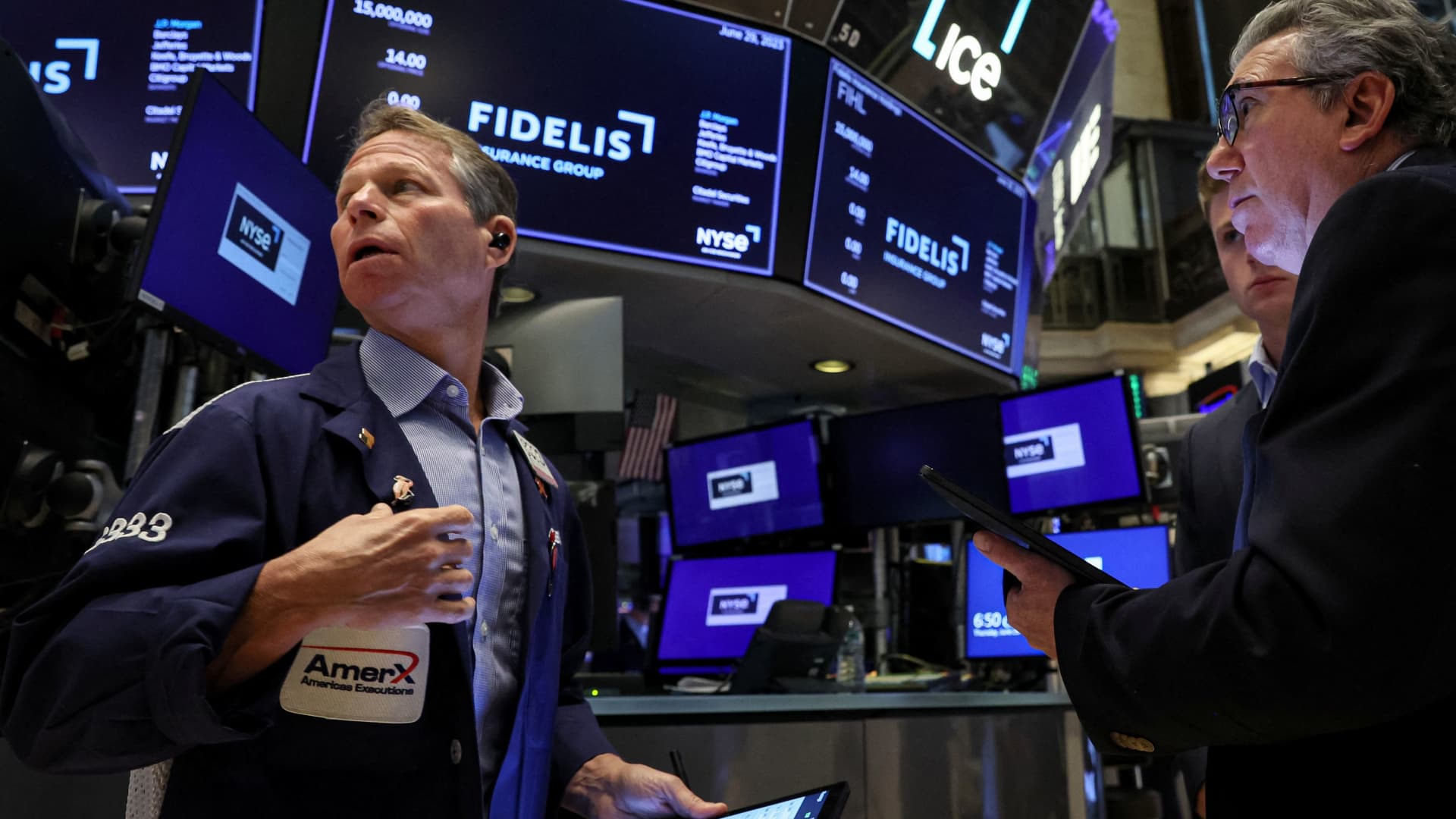Traders are seen on the floor of the New York Stock Exchange on June 29, 2023. Brendan McDermid | Reuters
Global stock markets experienced a sharp decline on Wednesday following a credit rating downgrade by Fitch. However, top economists are reassuring investors that there is no cause for concern.
Late on Tuesday, Fitch downgraded the United States’ long-term foreign currency issuer default rating from AAA to AA+. The agency cited an expected deterioration in fiscal health over the next three years, a decline in governance due to repeated political standoffs over the debt limit, and an overall increase in debt burden.
The announcement of the downgrade triggered a significant drop in U.S. stock futures, with the Dow Jones Industrial Average projected to fall nearly 300 points at the opening bell on Wall Street. The pan-European Stoxx 600 index also experienced a 1.6% decline in mid-morning trading in London, affecting all sectors and major stock exchanges. Stocks in the Asia-Pacific region also suffered losses across the board.
Notably, prominent economists such as former U.S. Treasury Secretary Larry Summers and Allianz Chief Economic Advisor Mohamed El-Erian criticized Fitch’s decision. Summers described it as “bizarre and inept,” while El-Erian expressed his confusion about the timing and reasoning behind the downgrade. U.S. Treasury Secretary Janet Yellen referred to the downgrade as “outdated.” Goldman Sachs Chief Political Economist Alec Phillips pointed out that the decision did not rely on new fiscal information, suggesting that its impact on market sentiment would likely be short-lived.
Phillips emphasized that Fitch’s projections align with those of Goldman Sachs, both estimating a federal deficit of around 6% of GDP in the coming years. Fitch also referred to projections from the CBO (collateralized bond obligation) in its medium-term outlook, indicating that the downgrade does not reflect new information or a significant difference in opinion about the fiscal outlook.
While this is the first downgrade of its kind since 1994, S&P downgraded the U.S. sovereign rating in 2011, which had a negative impact on market sentiment at the time. However, Phillips noted that there was no apparent forced selling. In fact, the S&P 500 index recovered 15% over the following 12 months. Phillips highlighted the importance of Treasury securities as a widely recognized asset class, which minimizes the potential selling pressure based solely on the ratings change. Moreover, Fitch did not adjust its “country ceiling,” which remained at AAA, suggesting that other AAA-rated securities issued by U.S. entities would not be negatively affected.
Chris Harvey, Head of Equity Strategy at Wells Fargo Securities, expressed confidence that the Fitch downgrade would not have a similar impact to the 2011 S&P downgrade. He pointed out that the macro environment and other factors are significantly different. Harvey expected any stock market pullback to be short and shallow.
Looking ahead, seasoned investor Mark Mobius suggested that the Fitch downgrade could prompt investors to reconsider their strategies concerning U.S. debt and currency markets. Mobius recommended diversifying holdings away from the U.S. and towards equities as a means of protecting against potential currency deterioration.
Global CIO of equity at Allianz Global Investors, Virginie Maisonneuve, urged the market to consider other triggers that could lead to a more prolonged downturn. She acknowledged Fitch’s rating, stating that it still falls within investment grade and reflects the past. Maisonneuve highlighted the presence of other potential consolidation triggers, such as inflation peaks and slowing growth, but noted that core inflation remains a factor to monitor.
In conclusion, while the Fitch credit rating downgrade initially caused a decline in global stock markets, economists and experts believe that the impact will be short-term. They emphasize the alignment between Fitch’s projections and those of other institutions, indicating that the downgrade does not reflect new information or a difference in opinion about the fiscal outlook. Investors are advised to observe other potential triggers for market consolidation and consider diversification strategies.
Denial of responsibility! VigourTimes is an automatic aggregator of Global media. In each content, the hyperlink to the primary source is specified. All trademarks belong to their rightful owners, and all materials to their authors. For any complaint, please reach us at – [email protected]. We will take necessary action within 24 hours.


